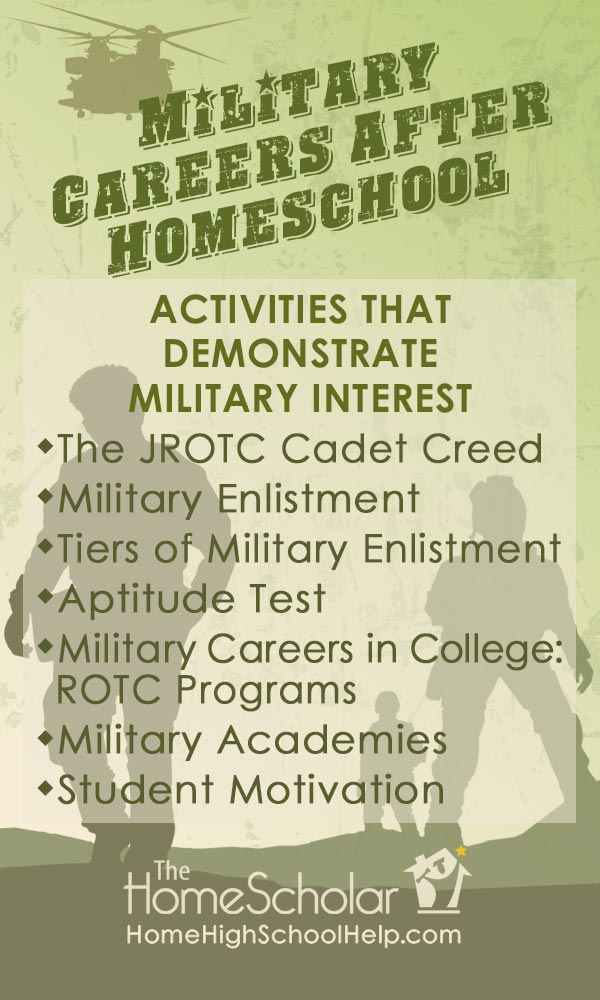
Military Careers After Homeschool
Homeschoolers love their country, and many want to show their patriotic pride by serving in the military. All branches of the military and all military academies are homeschool friendly. They love when patriotic teenagers join their fold. The military wants to see proof of academics, proof you have obeyed your state homeschool law, and proof that your child is physically fit and demonstrates leadership abilities. For all military careers, make sure to keep your high school transcript up to date, every year, without fail. The Total Transcript Solution will be perfect!
The branches of military service are: Air Force, Army, Navy, Marine Corps, and Coast Guard. While similar, each branch has unique requirements, so I can only provide general guidelines to help you begin researching. Your child can enter the military by enlisting, applying for the ROTC program, or entering a military academy. They all have physical requirements, educational requirements, and citizenship requirements. Learn more about joining the military at this site: Today's Military: Joining Eligibility.
Quick Links

SAT and ACT Tests
The most common outside documentation provided by public, private, and homeschool students are SAT® or ACT®. The SAT is accepted at almost all universities and is often used to determine college admission and scholarships. The test covers reading and writing and math. The ACT is also accepted at almost all universities, and can also be used to determine admission and scholarships. That test covers reading, writing, math and science reasoning. To best use this form of outside documentation, give your student a sample test at home, to determine which test is a better fit for your child. Most students can improve their score with consistent, daily practice.

Activities that Demonstrate Military Interest
To become a stand-out candidate, consider activities that demonstrate an interest in the military. You can encourage delight directed learning and exploring a vocational calling while your child is still homeschooling. Each branch of the military offers a youth-oriented program for high schoolers. Paramilitary experiences can prepare for these kinds of careers as well.
Check out these options to see if they might be a good fit for your child and check to see if they are available in your area.
- U.S. Army JROTC
- Civil Air Patrol - United States Air Force Auxiliary
- U.S. Naval Sea Cadet Corps
- Young Marines
- Law Enforcement Explorer Program
- Boy Scouts of America: Eagle Rank
These programs emphasize life skills valuable for every student. Your child can gain skills such as leadership, confidence, and discipline, which are necessary to be successful in any career. Look at the U.S. Army Junior ROTC creed and ask yourself if these are the qualities you want to see in your teen.

The JROTC Cadet Creed
- I am an Army Junior ROTC Cadet.
- I will always conduct myself to bring credit to my family, country, school and the Corps of Cadets.
- I am loyal and patriotic.
- I am the future of the United States of America.
- I do not lie, cheat or steal and will always be accountable for my actions and deeds.
- I will always practice good citizenship and patriotism.
- I will work hard to improve my mind and strengthen my body.
- I will seek the mantle of leadership and stand prepared to uphold the Constitution and the American way of life.
- May God grant me the strength to always live by this creed
Just as there are many branches of the military to consider, there are several paths to get there, including enlistment, ROTC, and academies.

Military Enlistment
Homeschoolers can successfully enter the military directly from a homeschool environment. They must possess a homeschool diploma and submit transcripts at the time of enlistment. Course work must involve parental supervision, the transcript must reflect credit hours per subject used in a traditional high school, and the diploma must be issued in compliance with applicable state laws.
Laura, pictured above, is a homeschool graduate who enlisted in the National Guard while still a junior in high school.
"I joined the Army National Guard as a junior in high school. I was seventeen. And I was, you guessed it, homeschooled! The recruiters I worked with couldn’t believe that I was self-motivated, which comes naturally after being homeschooled; I was able to fill out paperwork correctly and in a timely manner. And most of all, they couldn’t believe how easy it was for me to pass a background check. I qualified for a Top Secret security clearance (which due to medical issues, I never ended up using). I had never done marijuana, been convicted of a felony, and was able to provide every reference they asked for. Weird, right? My homeschool education ABSOLUTELY prepared me to pass the ASVAB with an extremely high score, and I was offered a job designation in the field that I wanted (intelligence). I had to laugh, though, because my scores also qualified me for a mechanic position; I am the least mechanically-minded person I know! If your child is called to serve this great country, please know that being homeschooled might just make him an excellent candidate." - Laura
Tiers of Military Enlistment
Today homeschoolers are considered "Tier 1" recruits, on par with their public schooled peers. Many students with an alternative education have been successful in the military. There are three tiers of enlistment.
- Tier 1 – High school graduates or non-graduates with some college credits
- Tier 2 – General Education Development (GED®)
- Tier 3 – Those with no education credentials
Homeschoolers must present a homeschool diploma provided by the parent. You may be asked to show you have obeyed local homeschool laws, including presenting any documentation required by your school district, such as a declaration of intent to homeschool. Each homeschooler must present a transcript. It must be clear that the parent directed the child’s education. Presenting a GED® causes unnecessary complications that can affect the student’s tier standing.
Aptitude Test
All recruits must also take the Armed Services Vocational Aptitude Battery (ASVAB). The ASVAB is a multiple choice test, administered by the US Military Entrance Processing Command. It is used to identify which jobs (Military Occupational Specialties) are best for the recruit, and determine qualification for enlistment. Scoring well on the ASVAB test is important. Look up practice tests on the internet, or have your child take classes to prepare for the test at a local center.
The ASVAB Test measures:
- General Science - knowledge of life science, earth and space science, and physical science
- Arithmetic Reasoning - ability to solve basic arithmetic word problems
- Word Knowledge - ability to understand the meaning of words through synonyms
- Paragraph Comprehension - ability to obtain information from written material
- Mathematics Knowledge - knowledge of mathematical concepts and applications
- Electronics Information - knowledge of electrical current, circuits, devices, and electronic systems
- Auto and Shop Information - knowledge of automotive maintenance and repair, and wood and metal shop practices
- Mechanical Comprehension - knowledge of the principles of mechanical devices, structural support and properties of materials
- Assembling Objects - ability with spatial relationships
Students must also take the Assessment of Individual Motivation test, which is a 20-minute pencil and paper test. The AIM test score is used to obtain data and does not affect qualification for enlistment.
The Army also offers enlistment cash bonuses to homeschool graduates, providing they score high enough. They get the same incentives as traditional high school graduates, including up to $40,000 for enlistments lasting three years or more. If your child is thinking of joining the military upon high school graduation, you may want to consider having them apply to a military academy or for ROTC scholarships in college.

Military Careers in College - ROTC Programs
As you are guiding your child through college preparation, do some research on the ROTC program. ROTC stands for "Reserve Officer Training Corps" and is a college program offered at many universities that prepares young adults to become officers in the U.S. Military. In exchange for a paid college education and a guaranteed post-college career, cadets commit to serve in the Military after graduation, so don't take this lightly, it is serious business. ROTC representatives attend college fairs, so you can research this option as you are looking for colleges. Read more at: Today’s Military ROTC Programs
The ROTC loves to see leadership qualities in candidates, and leadership can take many forms. It seems as if parents think about leadership in terms of their own high school experience, as if you have to be captain of the football team or class president to demonstrate leadership. Instead, consider leadership experience something that happens when you are doing what you love long enough to get good at it. Leadership skills can mean loving an activity so much that your child becomes a natural leader. This may happen in Boy Scouts, Youth & Government, Speech and Debate, or other groups that have leadership roles to be filled.
If your child is beginning high school, don't look for an activity called "leadership." Instead, look for genuine activities that your child loves, so they can become a leader naturally. You may not know in advance how this leadership role will play out.
Military Academies
All the military academies are homeschool-friendly, with a clearly written homeschool policy for admission. However, military academies are some of the most elite schools in the nation, much like Harvard and Yale. For this reason, they admit few students. This means they reject many highly qualified candidates. Your child can seem perfect on paper, but be rejected by one or more military academies.
Military academies want much more than academics. They want the intangible and impossible to quantify with test scores. These include proof of physical fitness and endurance, and proof of leadership. Demonstrating these qualities isn't enough, they want verifiable proof. Understand their requirements and provide proof as needed.
Military academies want much more than academics. They want the intangible and impossible to quantify with test scores. These include proof of physical fitness and endurance, and proof of leadership. Demonstrating these qualities isn't enough, they want verifiable proof. Understand their requirements and provide proof as needed.
Consider community college as an option for your child. Although it's not something I normally recommend, for military-minded individuals eager for an appointment to an academy, this option might be a good idea. Research is necessary. Remember that community college can be a rated R environment, but a military academy is also an adult environment. Weigh your options carefully, as you determine the best preparation for your child.

Student Motivation
Remember that when looking at a Military Academy or Ivy League school, admission requires hard work and high scores. Once they get in, it continues to require hard work and an inclination to achieve high scores academically! In other words, the desire needs to come from the child, more than the parent. All the wishing in the world won't make them successful in an Academy or Ivy League school without the internal motivation that only comes from the heart of the child.
Sara was fortunate to receive a nomination to the U.S. Naval Academy from our representative and a nomination to the U.S. Air Force Academy from one of our senators. Unfortunately, she did not receive an appointment to either school, although she was qualified in every area. We are so very proud of her accomplishments and more importantly, her tenacity.
Sara also applied for an Air Force ROTC scholarship and received a full tuition scholarship! These are also quite hard to come by (15,000 applicants, 4,000 qualified candidates and 911 scholarships offered in 2011) so that is her plan B. She was accepted at Miami University in Oxford, OH, as well as Ohio State university and received merit scholarships from both schools. With her combined scholarships, school will be paid for!
There are several things I would share with parents about this entire process. Obviously, first I would tell them to use all of the resources that you have made available! Seriously! While I had always kept good records, you really helped me put it all together in a very concise, readable, and professional way.
As far as applying to the academies and for ROTC scholarships my first piece of advice would be to make sure it is completely student driven. I honestly did very little except to send records and letters of recommendation when Sara asked me to do so. I did not keep up with due dates or anything! If a young person has a desire to serve as an officer, then they have to show the initiative and go through many interviews with congressional staff members, liaison officers and ROTC commanders. Being a "helicopter parent" is definitely a no-no at this point. I did have contact with the academic counselor at the Air Force Academy as she needed some clarification for a class that Sara had taken at a small private school (with no school profile!) and she commented on the quality and thoroughness of Sara's records.
For the academies and ROTC, a transcript will not suffice. Even members of congress require school documents with the nomination applications! I had to send detailed course descriptions and lists of textbooks we had used so it is best to keep up with this on a yearly basis so you can just pull it together at the end. Also, be prepared to write letters for your own child! I would have never thought that anyone would want me to do so but all the academies, ROTC and our senators and representative each requested this. It was initially difficult but I remembered what you had said to me about describing how mastery of subjects had guided our decisions and that helped to focus my remarks.
I also think it is important to think of one quality about your child and describe how that is demonstrated by your child's accomplishments. I focused on Sara's quality of tenacity (in abundance since birth!) and how she simply never gave up even if she initially had failed at something . . . like when she didn't get into our city's competitive youth orchestra on the first try. She was hurt and disappointed but practiced harder and got in the next year
Once Sara received the ROTC scholarship, we have accompanied her on visits to detachments and the officers are very friendly and that's when you can become more involved. But ride in the "back seat" until then. The commander of the Miami University detachment shared with us that his top 2 cadets in the detachment were homeschooled and he is very excited to have Sara join them.
You have really made a difference in our lives and helped two young people achieve their dreams by helping their mom, so our family thanks you from the bottom of our hearts!
If it is a dream, be tenacious!
For those students who want to attend one of the military academies, don't give up hope. Sara had accepted her ROTC scholarship and was set to activate it at Miami University when she received an email in the middle of May asking if she would be interested in accepting a Falcon Foundation Scholarship from the U.S. Air Force Academy to attend one of eight military prep schools this and then matriculate at the academy in June. Virtually all students who take this path are admitted, so she jumped at the opportunity! She had to go through the nomination process again but the Academy application is quite simple.
All the academies have similar programs, so don't be discouraged if an appointment is not offered in the first year. In fact, many academy students apply while in college and participate in the ROTC. Students can enter the academy until the age of 21, so if it is a dream, be tenacious.






